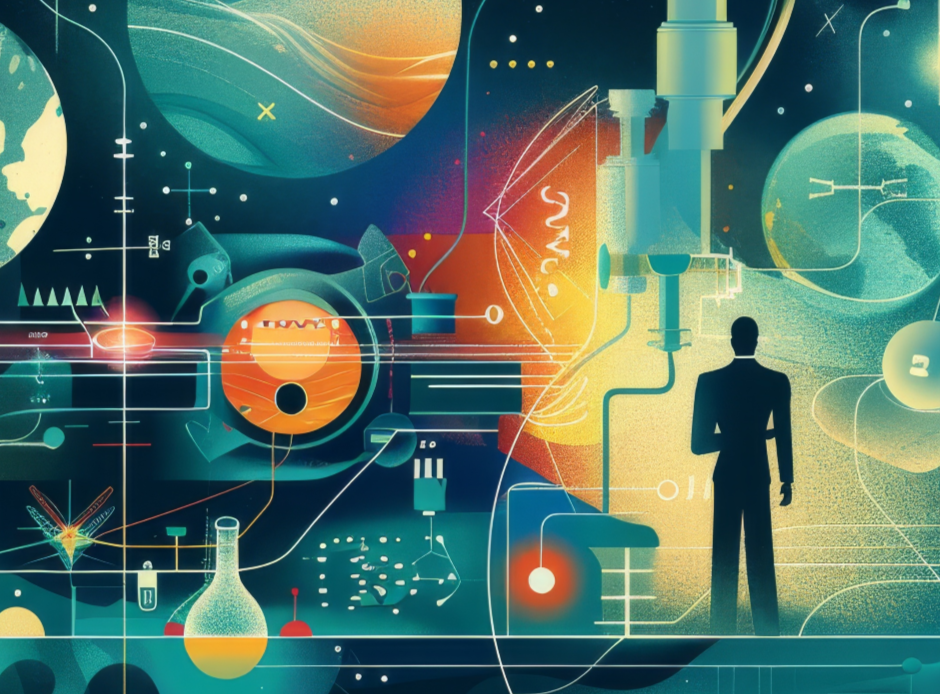IAS Winter Community Event
In a constantly shifting landscape of knowledge, the Institute for Advanced Studies invites you to explore the core of interdisciplinarity. Our annual community event “Uniting disciplines through interdisciplinary research” brings together fellows and pioneers in the field. As we confront today’s global challenges, interdisciplinary research empowers us to address complex issues that no single discipline can solve alone, promoting collaboration and nurturing the next generation of scholars.
Programme
-
13.30 – 14.00
Coffee
-
14.00 – 14.15
Welcome address by Prof. Conchita D’Ambrosio, member of the IAS Scientific Council
-
14.15 – 15.00
IAS Audacity Project: “Luxembourg Time Machine” by Prof. Andreas Fickers (C2DH), Prof. Emma Schymanski (LCSB)
-
15.00 – 16.00
Keynote: “Surfing to the Louvre. A history of online landscapes for kids, 1995 – 2005” by Prof. Helle Strandgaard Jensen – Aarhus University
-
16.00 – 16.30
Coffee break
-
16.30 17.30
Keynote: “The Weaponization of Artificial Intelligence” by Dr. Olivier Del Fabbro – ETH Zürich
-
17.30 17.45
Closing words by Prof. Claus Vögele – Head of IAS
-
17.45 – 19.30
Networking dinner
Director of the Luxembourg Centre for Contemporary and Digital History
Since 2016, Prof. Andreas Fickers is the director of the Luxembourg Centre for Contemporary and Digital History (C²DH) and head of its Digital History Lab. He is currently Professor for Contemporary and Digital History and Head of the FNR funded Doctoral Training Unit “Deep Data Science of Digital History” (D4H) and coordinates the Trinational doctoral school. Furthermore, he is the editor of the Journal of Digital History and co-editor of the book series.
Full professor in Environmental Cheminformatics
Prof. Emma Schymanski is head of the Environmental Cheminformatics (ECI) group at the LCSB, University of Luxembourg and special advisor to the rector for Open Science and Research Data Management. Her research combines cheminformatics and computational (high resolution) mass spectrometry approaches to elucidate the unknowns in complex samples, primarily with non-target screening, and relate these to environmental causes of disease.
Luxembourg Time Machine – IAS Audacity Project
LuxTime is an Audacity project whose main objective is to build and visualize different datasets that will include information from three different fields and scientific perspectives, namely eco-hydrology, environmental cheminformatics and history. LuxTIME used the industrialization of the Minette region, as a testbed for methodological and epistemological reflections on how to study the impact of environmental changes on the health of the local population in a long term perspective.
Associate Professor of Contemporary Cultural History – Aarhus University
Prof. Helle Strandgaard Jensen is an Associate Professor of contemporary cultural history at the Department of History and Classical Studies, Aarhus University, Denmark. She also holds a joint directorship at the Center for Digital History Aarhus (CEDHAR). Jensen’s work focuses on the contemporary history of mass media, childhood, and digitization in Scandinavia, Western Europe, and the US after 1945. Prof. Jensen is a member of the Scientific Council of the Institute for Advanced Studies since October 2022.
Surfing to the Louvre. A history of online landscapes for kids, 1995 – 2005
This talk explores how the rise of the WWW has influenced childhood. Standing at the beginning of the project, Prof. Strandgaard reflects on the interdisciplinary challenges of combining traditional historical approaches and computational methods. Probing the sources she has collected thus far, she will show how global, digital possibilities (e.g. making friends across the world and ‘going’ to the Louvre) were conceptualised in Internet guidebooks for kids, parents, and educators in Denmark and the United States, and compares these to the online landscapes available to kids at the time.
Senior Researcher at the Chair for Philosophy, ETH Zurich
Olivier Del Fabbro is Senior Researcher at the Chair for Philosophy, at ETH Zürich. His research interests are philosophy of technology with special interests in Artificial Intelligence and Complex Systems, Philosophy of Medicine and Philosophy of War and Conflicts. Dr. Del Fabbro has also historical interests in US-American Pragmatism and French Historical Epistemology. He has held research visits at the University of Massachusetts Boston, University of California Berkeley, and the Santa Fe Institute.
The Weaponization of Artificial Intelligence
In my talk I will first look at the historical relationship between Artificial Intelligence and the military – a relationship that I trace back to Alan Turing’s work at Bletchley Park. In a second step, I will then look at how Artificial Intelligence is used in today’s theaters of war. It will become evident that AI is a versatile technology, allowing be used as weapon in many diverse forms. From mass control and information warfare, to autonomous weapon systems such as drones, and lastly tinkering and thus asymmetric warfare, the weaponization of AI is today at the forefront of contemporary warfare.
Contact: ias@uni.lu
